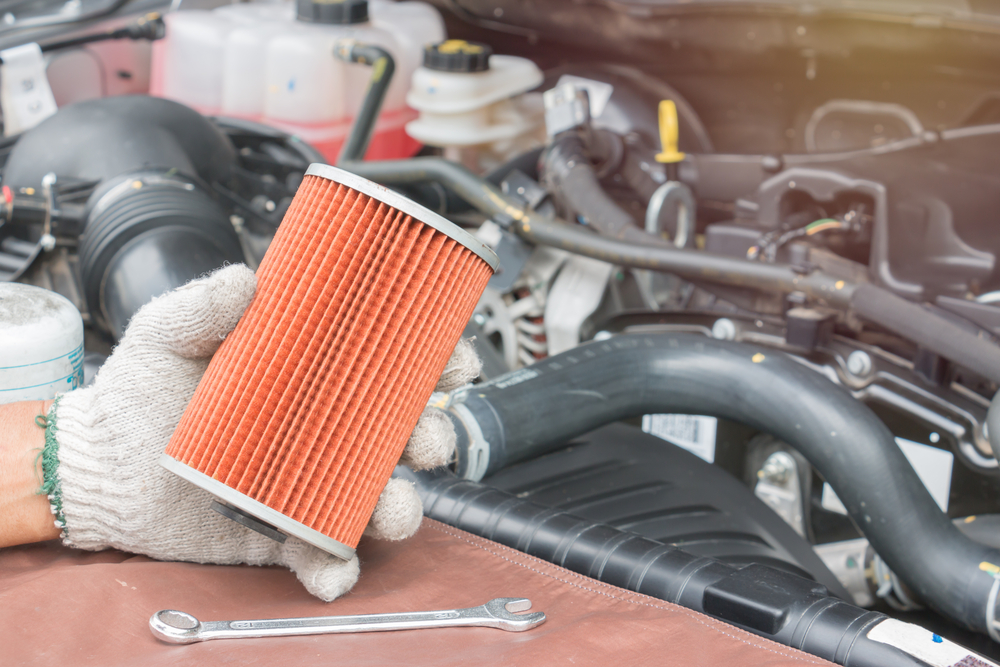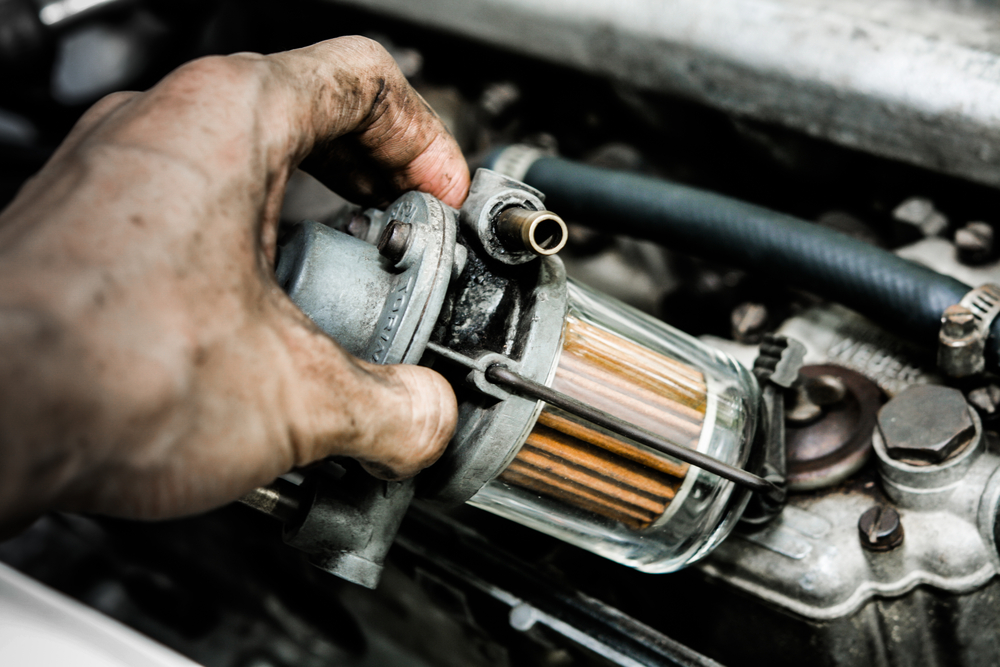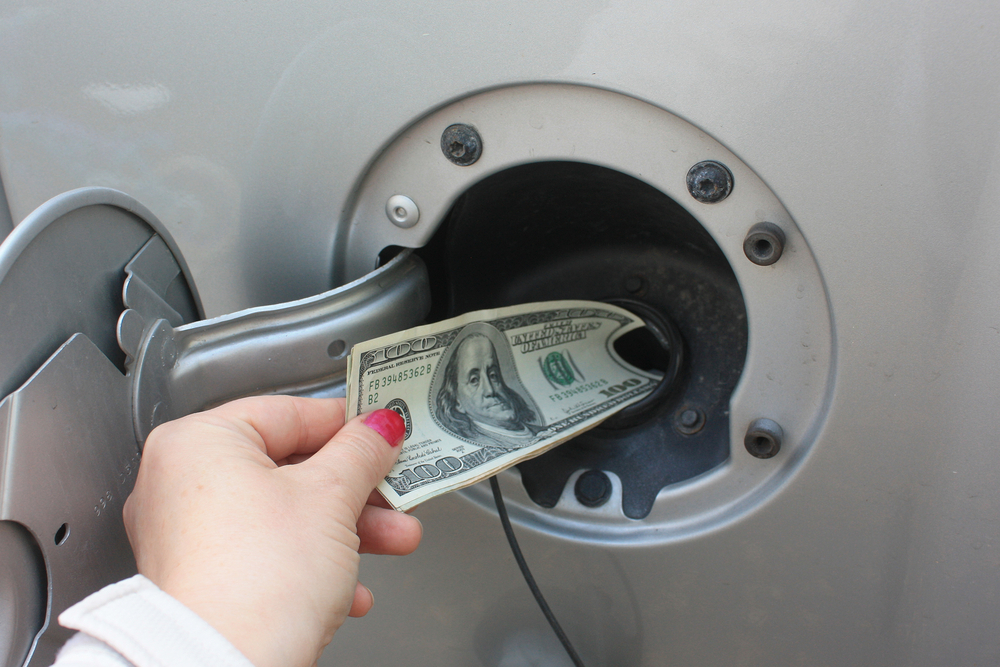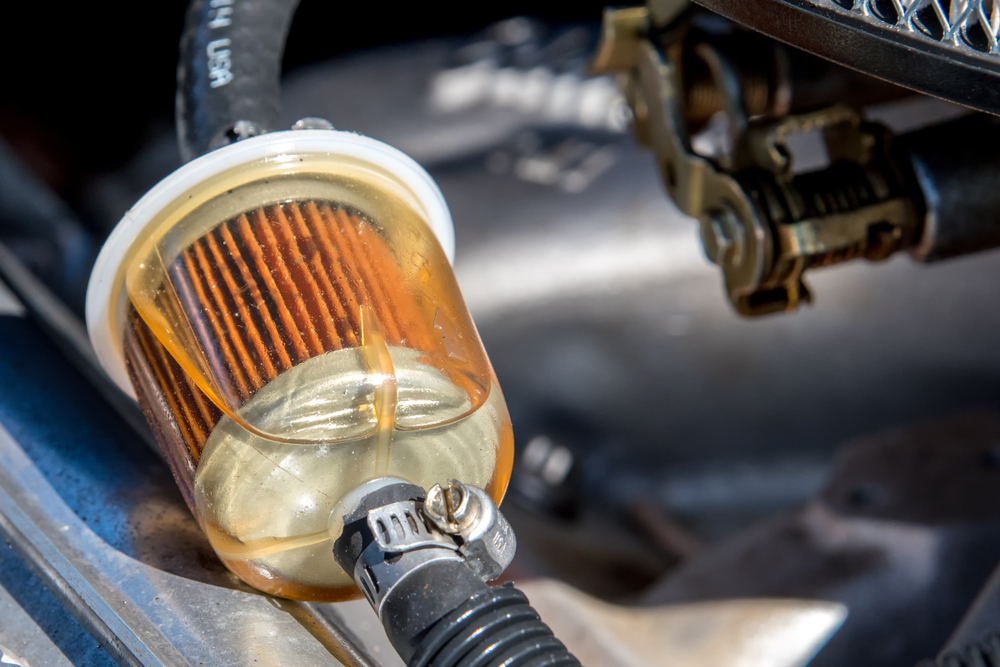
A bad fuel filter will show many symptoms to the do-it-yourselfer they can easily identify at home. There are several easy ways to identify when you need to replace your fuel filter. Always start with a high-quality repair manual for your vehicle before you service the fuel filter. A good service manual will tell you what the steps are, how to identify the problems you are having and what you need to do about it.
The First Symptoms of a Bad Fuel Filter
The first symptoms of a bad fuel filter driver's notice will probably be a check engine light. Most modern cars today will alert the driver of a problem associated with a bad fuel filter before any other signs of a problem begin to show symptoms.
You should use a good code scanner to diagnose your check engine light. DTC code scanners like one of these are invaluable tools to have when working on cars or trucks newer than 1996 that use OBDII technology. You can usually find the codes displayed by an OBDII scanner in your vehicle workshop manual. Your car will usually have an OBDII port located under the dash. Your service manual should explain where to find the OBDII port on your car or truck.
Common Symptoms of a Bad Fuel Filter
 Older cars will have fuel filters in a glass bowl. Most modern, fuel-injected cars will use a sealed canister filter.
Older cars will have fuel filters in a glass bowl. Most modern, fuel-injected cars will use a sealed canister filter.A bad fuel filter will typically cause reduced fuel mileage. The majority of fuel filters are made of a porous material that traps dirt and debris contained in the fuel and prevents deposits and damage to engine components. Once the sponge-like material fills up with dirt, the flow of fuel will decrease significantly.
A vehicle will experience reduced fuel mileage with a dirty fuel filter because the engine will not have enough fuel to burn properly. Once the fuel pressure starts to decrease, the PCM will have a hard time maintaining a stoichiometric air/fuel ratio, which may cause misfires and reduce fuel-efficiency. A vehicle with a dirty fuel filter may be harder to start, also. This symptom is most noticeable to the driver when starting the car for the first time of the day. When starting cold, an engine needs more fuel to run correctly until it reaches its normal operating temperature and a low fuel pressure caused by a clogged fuel filter will have a greater negative effect then.
Severely obstructed fuel filters may cause the car or truck to lose power under sudden acceleration, like when passing on the freeway or climbing a steep hill. Drivers may also notice symptoms of an uneven idle or misfires. A misfire feels like an engine skips a beat. Multiple or successive misfires can cause an engine to stall and may even lead to more serious engine damage in the long run.
A clogged fuel filter may sometimes cause your fuel pump to fail before you even notice the symptoms of a bad fuel filter. Blocked fuel filters cause the fuel pump to work harder, often causing early failure and the need for car owners to replace the fuel pump. Car owners should then always replace the fuel filter when installing a new fuel pump.
 Fuel filters are typically installed inline with the fuel line right after the fuel pump.
Fuel filters are typically installed inline with the fuel line right after the fuel pump.Common OBDII Codes Relating to Fuel Filters
Mechanics use OBDII scanners to diagnose errors logged by the engine and transmission computers that impact vehicle performance and emissions controls. The errors are stored as codes. Codes starting with the letter P are known as generic codes and are related to the powertrain. These are used by all manufacturers to indicate the same error, regardless of vehicle make.
Codes that mechanics associated with a bad fuel filter are often related to fuel delivery or exhaust emissions codes. A few common codes used by most vehicle manufacturing companies are:
Codes
- P0087 - Low Fuel Pressure - Technicians often associate this code with a bad fuel filter when diagnosing a drop in pressure that indicates the filter is blocked and unable to allow enough fuel to flow through the pipe.
- P0171/ P0174 - Bank (1)/(2) System Too Lean - Mechanics diagnose bad fuel filters frequently when this code is displayed. Typically, this code indicates that not enough fuel is being burned. Over time, this condition can lead to catastrophic engine failure due to high temperatures.
- P0101 - Mass Air Flow Sensor fault - Inadequate fuel supply due to a bad fuel filter may cause the vehicle to display a code indicating a fault with the mass airflow sensor.
- P0300 - Engine Misfire - A bad fuel filter can cause the engine to run unevenly, causing the computer to log an engine misfire code.
Interpreting Codes
Manufacturers use these generic codes to indicate the types of problems listed regardless of vehicle make. Other codes may be stored that are manufacturer-specific that indicate a bad fuel filter. An OBDII scanner can be useful to determine whether a bad fuel filter is the cause of your engine fault codes by displaying useful information. The fuel pressure, the injection time, short and long fuel trim data, which actuators are on or off, if the fuel pump is working or not, readings coming from the O2 sensors as well as, misfires counts and even how the PCM is behaving to try to correct the situation are all valuable information.
A PCM working in an open-loop will often let you know that sensors are not correctly sending data to the computer while learning how to interpret different short-trim and long-trim values will help you locate where the problem is coming from a lot faster.
How To Know if You Need a New Filter
 The first symptoms of a bad fuel filter typically include poor gas mileage.
The first symptoms of a bad fuel filter typically include poor gas mileage.Decreased performance and reduced fuel economy are common symptoms drivers notice when a fuel filter is going bad. Today's computer-controlled vehicles can make it difficult for the DIYer to notice the symptoms. The powertrain control module (PCM) and the transmission control module (TCM) are capable of making real-time adjustments to compensate for minor changes in fuel pressure. Such adjustments will, in turn, gradually reduced the vehicle's fuel-efficiency. Most often, drivers will not know the fuel filter on their vehicle is going bad until it is too late.
Performance Problems
A bad fuel filter can cause a loss of power at higher speeds, like when passing on the freeway. It can also cause uneven and erratic idle. Some drivers may experience a bogging sensation as they attempt to accelerate from a stoplight. Your car may become harder to start, particularly in the morning. An uneven, irregular and rough idle should be a warning sign to the driver they need to plan on changing the fuel filter.
Symptoms of a bad fuel filter may be especially noticeable to drivers who regularly check their fuel mileage. A sudden and sustained decline in fuel mileage over a period of time could be an indication to the driver that the fuel filter is going bad.
Carbureted Vehicle Problems
 Carbureted cars and trucks will typically have a small fuel filter just before the fuel line enters the carburetor.
Carbureted cars and trucks will typically have a small fuel filter just before the fuel line enters the carburetor.Older, carbureted vehicles will exhibit many of the same symptoms. In almost all of these older vehicles, a check engine light will not indicate an issue with a fuel filter. Instead, drivers will notice sluggish acceleration and engine misfires when accelerating up hills. Decreased gas mileage and difficult cold-starts are also quite common when it comes to faulty fuel filters. Most carbureted vehicles will have a fuel filter mounted between the fuel pump and the carburetor.
A blocked fuel filter can cause a vehicle to idle rough and show symptoms of hesitation. A rough idle may happen because the engine cannot get enough fuel at idle.
To quickly test if the symptoms are related to a clogged fuel filter, simply remove the fuel filter and bypass it using a small rubber hose. If the engine goes back to normal, you know for sure your fuel filter needs to be replaced.
Why does a Dirty Filter Cause Problems?
Think of a fuel filter as a mesh screen that catches dirt. Gasoline often contains small bits of debris called particulate. Particulate can be sand, metal, and various other debris that cannot be burned. Without a fuel filter, these microscopic particles accumulate in the tight fuel passages necessary to make an engine work. Over time, these deposits can cause all sorts of problems, beginning with poor fuel economy and a lack of performance.
Engine Parts That Get Damaged
The first place that dirt may cause problems when a vehicle is typically the fuel pump. The pump can become clogged with debris, and the additional effort required for the pump to build up fuel pressure can cause the pump to stop working sooner than expected.
 Older vehicles used mechanical fuel pumps like this one. Modern cars typically use an electric fuel pump.
Older vehicles used mechanical fuel pumps like this one. Modern cars typically use an electric fuel pump.Fuel-injected cars can quickly have serious problems because of dirt entering the fuel system past the filter. Fuel injectors must stay clean to work correctly. A bad fuel filter can allow dirt to enter the fuel injectors and clog the nozzles. Drivers should inspect, remove and replace contaminated fuel filters as soon as possible to reduce any risk of creating correlated problems to other related components.
When should you change the fuel filter on your car?
Most car manufacturing companies recommend a fuel filter change should be done by the owner every 30,000 miles. Be warned though. A lot of recent vehicles don't have inline fuel filters anymore. On a 2017 Toyota Corolla, for example, the fuel filter is located inside the fuel tank and will probably never need to be replaced if you follow the manufacturer's maintenance chart. With recent Toyota's maintenance plans, there's not even one mention of a fuel filter inspection/replacement, even after 60,000 miles. In this case, the fuel filter should only be replaced if a problem is detected or when removing the fuel pump for whatever reason.
Some vehicles are even exempt from an in-tank fuel filter and only use the fuel pump's strainer to filter the fuel. The main reason being that fuel is now cleaner than ever before and the use of fuel tanks made of plastic has drastically reduced the risk of finding rust and debris inside of it. When inspecting fuel pump strainers on recent vehicles, you'll quickly notice the absence of debris of any kind, even way beyond 60,000 miles.
Since every car is built differently, always make sure to ask your car dealer for the recommended inspection or maintenance interval for your fuel filter. When in doubt, make sure to check into your car's repair manual and see if 1- there is actually an in-line fuel filter on your vehicle and 2- if it even needs to be replaced in the first place. Most in-tank fuel filters should last longer than the expected lifespan of your vehicle.
The Effects on the Environment
Today's fuel-injected cars and trucks are more fuel-efficient than vehicles built at any time in history. To accomplish these tight environmental controls, manufacturers rely on very specific conditions to exist within an engine. An engine that is running at its most efficient emits lower exhaust emissions. When fuel pressure is low due to a bad fuel filter, the engine tends to run hotter due to a lack of fuel. The hotter-than-normal exhaust gases can cause damage to catalytic converters, and vehicles that are running too lean will emit more pollutants.
Failed smog tests can indicate that a car has a bad fuel filter. Unfortunately, a smog test that reveals symptoms of a fuel filter problem indicates that damage is extensive and must be addressed by the driver immediately.
Last Words
Fuel filters are often overlooked by car owners when planning their car's maintenance schedule. However, if your vehicle is equipped with an in-line fuel filter, the benefits of regularly inspecting your filter greatly outweighs the risk related to driving your car around with a clogged fuel filter. In the case where a faulty fuel filter would cause your car to stall, the cost of calling a tow truck alone is far more expensive than the price tag associated with a fuel filter replacement. Not to mention the total cost of having your fuel pump replaced prematurely because of a bad filter, and you'll still have to replace the fuel filter when it happens anyway.
Luckily, most in-line filters are quite easy to replace and won't even require to use a hoist. Basic tools, a set of jack stands and a vehicle-specific repair manual to follow the correct fuel filter replacement procedure will often be more than enough for you to replace it yourself in your home garage. Never forget that DIY is often the cheapest way to go... as long as you know what you are doing. When in doubt, get yourself a trustworthy automotive repair manual and you should be able to save a lot of money on quick and easy maintenance jobs like this one!
